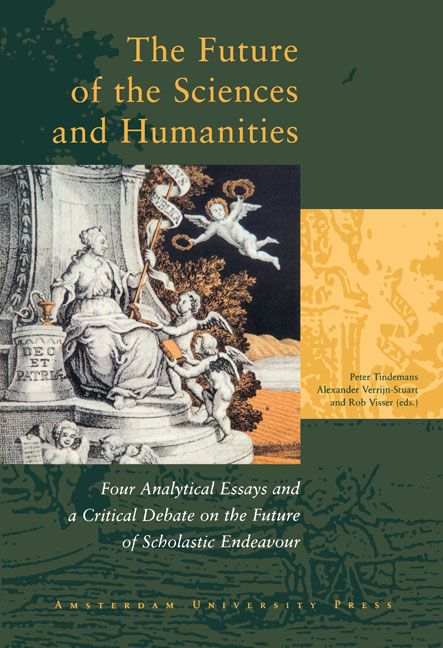 The Future of the Sciences and Humanities
The Future of the Sciences and Humanities Book contents
- Frontmatter
- Preface
- Contents
- 1 The Sciences and Arts Debate A review and some conclusions
- 2 Historical and Structural Approaches in the Natural and Human Sciences .
- The Role of Laws and Contingency in History
- 3 Science and Society in Flux
- Does A New Kind of Science Require a New Kind of Scholar or a New Kind of University?
- 4 Science for the 21st Century
- Redrawing Disciplinar Boundaries – but to What Degree?
- 5 Science and Democracy
- Science and Democracy: a Difficult Relationship: ‘An enlightened and elitist essay on an unresolvable problem’
- 6 Epilogue
- 7 Appendix
1 - The Sciences and Arts Debate A review and some conclusions
Published online by Cambridge University Press: 03 February 2021
- Frontmatter
- Preface
- Contents
- 1 The Sciences and Arts Debate A review and some conclusions
- 2 Historical and Structural Approaches in the Natural and Human Sciences .
- The Role of Laws and Contingency in History
- 3 Science and Society in Flux
- Does A New Kind of Science Require a New Kind of Scholar or a New Kind of University?
- 4 Science for the 21st Century
- Redrawing Disciplinar Boundaries – but to What Degree?
- 5 Science and Democracy
- Science and Democracy: a Difficult Relationship: ‘An enlightened and elitist essay on an unresolvable problem’
- 6 Epilogue
- 7 Appendix
Summary
The 1999 Prize Competition of the Holland Society1 challenged participants to express innovative views of the Sciences and Arts. Formally, they were asked to provide a meta-description such that newly emerging disciplines might be accommodated without the rigid categorization imposed by traditional nomenclature schemes. This overall objective was paraphrased as “indicating which elements might be helpful or, by contrast, obstructive in guiding scholarly endeavour in the 21st century”, possibly including “a reasoned rejection of the classical distinction sciences/humanities and other restrictive classifications, replacing these by a more effective taxonomy”. Simply put, how can we talk about esoteric or unexpected developments in constructive ways? How may scholars, administrators and politicians really understand each other when entering largely unknown domains?
A well-known example of the nomenclature dilemma is the borderline between physics and chemistry. Where do we position fundamental research on chemical compounds? Are ‘quantum chemical’ studies physics (because of their quantum mechanical formalisms), chemistry (because one investigates chemical structures) or even applied mathematics (when the study essentially depends on the ability to compute results mathematically)? Fortunately, the physicist active in this area will be able to publish results in a journal on ‘chemical physics’, whereas the chemist will refer to the subject as ‘physical chemistry’. Yet, in an era when all research is to be justified financially, a chemistry department may – and often does – object to new proposals if they cannot be classified strictly as ‘chemistry’, thus stifling innovation from within.
More problematic are the options for naming various applications of ‘computing’ (or ‘computation’, using these terms in the general sense of structuring abstractions such that they are capable of manipulation by computing machinery). Should research into ways of documenting art historical subjects such that subject-characteristic searches may be performed be called ‘art-historical informatics’ or ‘computational art history’? Is it a special branch of ‘artificial intelligence’ or of ‘information science’? Does it belong to the ‘humanities’, or is it a form of ‘software engineering’ normally positioned in the ‘sciences’?
The last example illustrates two further problems associated with one's natural desire for clear subdivisions.
- Type
- Chapter
- Information
- The Future of the Sciences and HumanitiesFour Analytical Essays and a Critical Debate on the Future of Scholastic Endeavor, pp. 9 - 18Publisher: Amsterdam University PressPrint publication year: 2002
